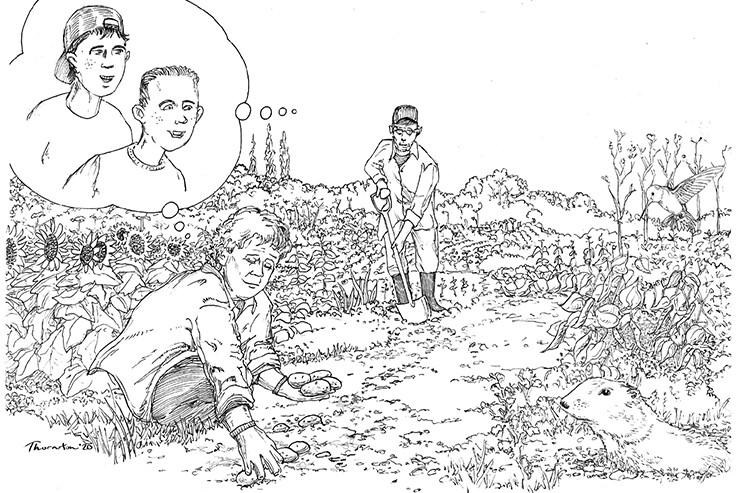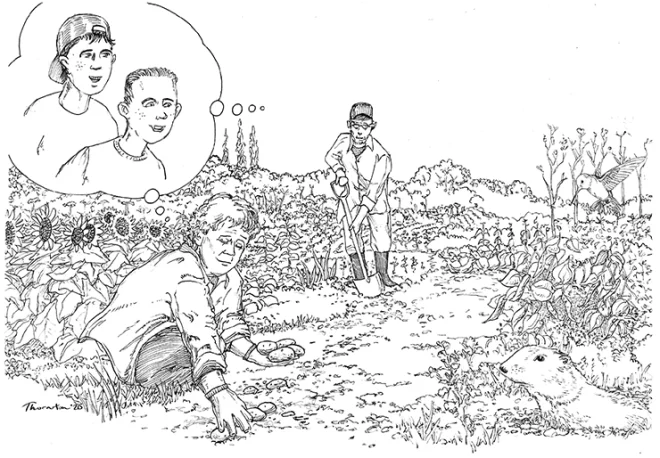
It’s Spring as I write this and we’ve already harvested some early greens and a few root vegetables like radishes. Daffodils, tulips, and hellebore brought some much-needed color to the grey days of Spring. And just the other day, I saw the shell of a Robin’s egg on the ground, though I couldn’t see into the tree to locate a nest. Already, my daughter thinks of these plants and wildlife as part of her family in a garden.
I completely understand the feeling. When you put so much love and care into tending your plants, it can feel like they’re part of your family. In fact, some of my houseplants have been with me longer than my human family! It’s not hard to find family in a garden, just ask Cynthia Pappas.
In Plant Parenthood, Cynthia shares the story of how she and her husband dedicated their time and energy to the garden once their two boys were out of the house and off to college. Trees, shrubs, flowers, vegetables, herbs—you name it, they planted it. And nurtured it.
Instead of helping with homework or taxiing kids to practices and events, Cynthia and her husband are now giving the garden “hours of care each night—planting, watering, hand weeding, and hoeing.”
It turns out, families and gardens both take a lot of work! I hope you get a kick out of this story.
Find Friends and Family In a Garden of Stories From Gardeners Just Like You
This story comes from our archive spanning over 30 years, and includes more than 130 magazine issues of GreenPrints. Pieces like these that imbue the joy of gardening into everyday life lessons always brighten up my day, and I hope it does for you as well. Enjoy!

Plant Parenthood
Well, now that the boys are gone…
By Cynthia Pappas

New Year’s Resolution: With no kids left at home to parent, George and I will focus our inexhaustible supply of energy on our garden. Maybe a few extra plants will help fill the emotional void. We decide to raise tomatillos from seed. We will indulge the gophers by planting enough potatoes so they can share in the harvest, and we’ll still have extras for the local food bank. We’ll enter the Lane County Fair. After all, now that our attention is undivided, our pickling cucumbers will be transformed into prize-winning specimens “true to type; deep in color; and uniform in size, shape, and texture.”
On the darkest, wettest day in February, George and I find ourselves at the local hardware store searching for something to lighten the impermeable gray. I wonder how Nat is doing back at his first year of college. He was home for such a short time on holiday break. My husband calls from the next aisle, excitedly: “Seed packets are half price!” We buy handfuls of herbs, flower, and vegetable seeds. I envision row upon garden row of bright, fuchsia-colored zinnias, tangerine nasturtiums, and dandelion-yellow sunflowers mixed with the deep greens of spinach and potato leaves, the delicate filigree of dill towering over it all.
In late March, we have the first part of our Oregon garden planted with peas, lettuce, spinach, and arugula. In early April, we set about methodically installing broccoli and onions. This year we attempt some exotic potato varieties, including Yellow Finn, Nooksack, Kennebec, and Russian Fingerling. The following weekend we add rows of snap peas and sugar pod peas, bush beans, and beets. A week later, the makings for Mexican feasts—cilantro, three varieties of peppers, and shallots—line up alongside rows of Chief and Torpedo corn. The vegetable garden expands to the size of a city lot—and that doesn’t include the carefully sown bachelor buttons, sweet peas, stock, and nasturtiums.
As the season progresses, we plant black walnut trees along the property lines, replacing what we lost in last Winter’s massive flood. We buy a truckload of shrubs at our friend’s nursery to plant under the birches. I fill terracotta pots with verbena, geraniums, petunias, and violets. The deck spills with a riot of red, purple, and yellow blossoms that hummingbirds can’t resist. Bumblebees charge the tubular bells of foxglove gracing the entryway. Red-breasted sapsuckers scree as they methodically flit among the birch trees. The osprey chirp overhead, and mallards tuck themselves into the brush lining the creek. As I hoe in the garden, a ring-necked pheasant peers out from the tall grass, trumpeting its hoarse, nasal call. Despite this cornucopia of wildlife, I miss the sound of our boys’ laughter and the inquiries of, “I’m starving. When’s dinner?”
In the evening, our ritual is to shed the 8-to-5 work clothes, put on dusty shorts and shirts, grab the hoe, and head for the garden. Two hours of care each night—planting, watering, hand weeding, and hoeing—substitute for correcting homework, offering advice, and attending band performances.
With each turning of the soil, I unearth more thoughts of our changed lives. We intended a smaller garden with the boys gone, but their father and I have become consummate nurturers. A vegetable garden cannot accommodate all our displaced love and attention. It has spilled over into a perennial garden filled with strawberries, asparagus, artichokes, blueberries, and raspberries.
There is no stopping us now. We map out a pumpkin patch to entice our nephews to visit. The scarecrow, stuffed with hay from the barn, stands sentinel at the corner post, beckoning them to enter and explore. Sunflowers, ornamental corn, and the orange globes of Big Max and Hybrid Autumn Gold fill the far corner of the garden.
I stand on the bedroom balcony gazing down on the garden like a proud parent. Rich, river-bottom loam peeks out between each row of green. Soon the plants will fill out. I have to pay close attention, or I’ll miss a stage of growth. The first true leaves on the lake beans have already appeared.
“We have broccoli heads already!” my husband calls out after a morning walk through the garden. It reminds me of the night we were reading the boys to sleep, and Josh decided he would read the story to us instead. Or that brief period of time when Nat wore the same size shoes as me. It all happened so quickly.
I revel in the tiny white blossoms on the potato plants; they remind me of baby teeth. The peas are getting so leggy, they’ve almost outgrown their support, like bare ankles peeking out from too-short pants.
My garden, my sons. Growing so fast. ❖
By Cynthia Pappas, published originally in 2020, in GreenPrints Issue #121. Illustrated by Russell Thornton

How do you feel about the garden as a part of your family?



